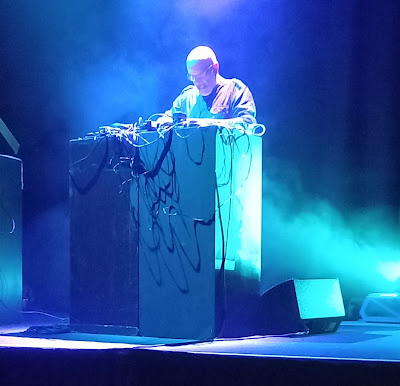 |
| Aniruddha Das aka Dhangsha |
Disruptive Frequencies: Gary Stewart, Amit Dinesh Patel, Nikki Sheth, Poulomi Desai, Nicole Raymond, Aniruddha Das - Nonclassical at Kings Place
16 July 2023, reviewed by Florence Anna Maunders
A fruit of Amit Dinesh Patel's research into cultural diversity in experimental sound, Disruptive Frequences featured six performers in almost complete darkness, giving a theatrical and almost religious aspect to the whole evening
Disruptive Frequencies is one of the results of Amit Dinesh Patel's research into cultural diversity in experimental sound – a project with the aim of addressing the the distinct lack of visibility of Black and Brown artists within the field. The record label, music promoter, events producer and charity Nonclassical worked together with the SOUND/IMAGE Research Centre (based at the University of Greenwich) to create this album, parts of which were presented live at this record launch / concert in Islington's Kings Place. In almost complete darkness, the stage was set with multiple altars of sound equipment, giving a theatrical and almost religious aspect to the whole evening.
Opening proceedings with his work Dark Energy Live Stream Track 2, Gary Stewart spun a compelling and complex web of manipulated white and filtered noise, delivered at crushing volume and building into a driven, lopsided pulsation, which successfully maintained an aloof poise of non-expressive abstraction over an extended span, with gargling, rumbling subterranean oscillations held in check and only infrequently allowed to emerge from a tightly controlled cage. The darkened, expectant silence which followed was galvanised by the overwhelming noise-scape of Patel's extended sonic essay Chakria. Defying all attempts at a conventional formal approach, this was a piece which embraced a sense of timelessness. Lacking the convention of any regular pulsation to divide the passage of time from moment to moment, the unearthly timbres seemed to exist in an unlimited aural void, defined without recourse to human expectations, exploring an alien landscape of crackling static electromagnetic fields, cycling machinery and broken transmissions.
In complete contrast, the two pieces presented by Nikki Sheth, developed from field recordings, both conveyed a very real sense of place. The splashing water, manipulated honking geese and flapping wings of Sandwell Valley worked in harmony to effectively construct an impressionist landscape with sounds, a mediation on location without any need for the Western affectations of form, structure and long-term development, as did the often beautiful collage of subtly edited bird calls which comprised Pemberton Gardens.
The DIY punk aesthetic of the self-taught multidisciplinary artist and curator Poulomi Desai was very much evident in the overwhelming sonic experience of her evocatively titled Electromagnetic signals from our raging Black Earth, all our flora and fauna are burning, which lived up to its titular expectations with blasts of distorted, furiously raging electronic signal-noise, layered with insistent warning sirens, the clangour of broken circuitry, and a sense of theatrical overload. Very much a highlight of the evening, and of the album as a whole, this is music for the end of the world – a distress call from the heart of destruction rendered in coruscating electronic timbres at ear-pulverising volumes.
Exploring a wide range of sampled distorted voices & glitchy synths, Nicole Raymond's set was a study in the use of panned delays. In a live setting, as opposed to the immersive world of headphones, this created a very different impression, somehow both more focused and simultaneously more incoherent. Her techniques strip sounds of their original meanings and contexts, like a collage of panels from different comics, presented in the infinitely receding reflections of a hall of mirrors - somehow creating a new meaning, but a meaning which is always just out of reach to the listener. Raymond's sound world is hypnotic, disorientating and perplexing, with a sense of dark humour.
Concluding the evening, the vastly experienced eminence behind the whole project, Aniruddha Das (aka Dhangsha) performed a live electronic remix of his own tracks Mahapralay and Germinate. Drawing on a wide range of cultural influences, from dub to bhangra via African clave patterns, this was the most traditionally metrical and groove-based work on display across the evening, as evidenced by the number of bobbing heads in the well-attended and mixed audience. Additionally, as the only artist this evening to work extensively with synthesis, his was the music with the most pitch-based content. Continually varied through constant repetitions by gradual alterations, disintegrations, distortions and fragmentations this was music that seemed constantly dancing on the edge between rigid order and collapse into total chaos. Straddling a line between tradition(s) and innovation, Das presented a set which was on the verge of danceable, yet never crossing the line into predictability of phrase, pattern or timbre.
Disruptive Frequencies is available as a double vinyl or download from
Nonclassical.
Disruptive Frequences at Kings Place, 16 July 2023
Bantu (Gary Stewart) - Dark Energy Live Stream Track 2
Dushume (Amit Dinesh Patel) - Chakria
Nikki Sheth - Sandwell Valley
Poulomi Desai - Electromagnetic signals from our raging Black Earth, all our flora and fauna are burning
NikNak (Nicole Raymond) - Combative Embers / Swirls
Nikki Sheth - Pemberton Gardens
Dhangsha (Aniruddha Das) – Mahapralay / Germinate
Never miss out on future posts by following us
The blog is free, but I'd be delighted if you were to show your appreciation by buying me a coffee.
Elsewhere on this blog
- Carmen in in the Quarry: Arnaud Bernard transforms Bizet's opera into film set in 1930s-era Spain on Oper im Steinbruch's spectacular stage - opera review
- There are things to discover still: Benjamin Appl on exploring themes of temptation and seduction in his latest album, Forbidden Fruit -interview
- An engaging and eclectic selection: Soar from Alastair Penman and Jonathan Pease - record review
- Any performance of Verdi's Don Carlo is an event: Verdi's large-scale drama returns to Covent Garden with Lise Davidsen and Brian Jagde - opera review
- An engaging diversity & fierce intelligence: the piano music of Bernard Hughes played by Matthew Mills - record review
- Imagination and seduction: Huw Wiggin in Rhapsody, music Debussy, Joseph Phibbs, Iain Farrington, Coates, Jennifer Watson, and Liszt - record review
- Heard in her own right: an important new disc explores Fanny Hensel's songs, focusing on the unknown and unrecorded - record review
- The Elixir of Love: Wild Arts brings Guido Martin-Brandis' enjoyably characterful production of Donizetti's opera to the Thaxted Festival - opera review
- Mendelssohn, Schumann and a Noah Max premiere: Emma Abbate & the Tippett Quartet at the Thaxted Festival - concert review
- Delving into her Greek background: Lisa Archontidi-Tsaldaraki's debut recital places 20th-century Greek composers alongside Bartok, Szymanowski and Ravel - interview
- I have rarely heard Bach's Mass in B minor performed with such consistency of style, integrity and sheer musicality: Vox Luminis at Wigmore Hall - concert review
- Home




.jpg)

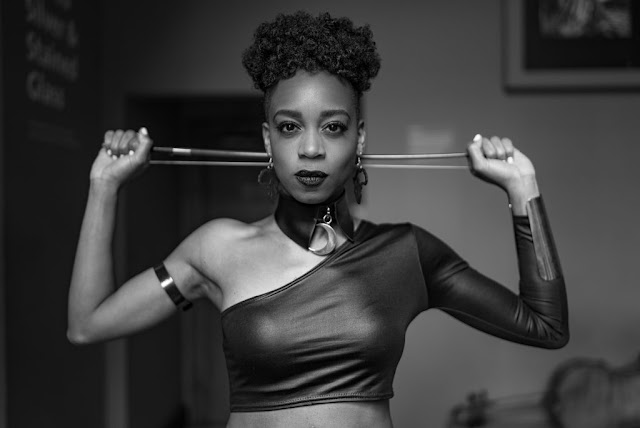




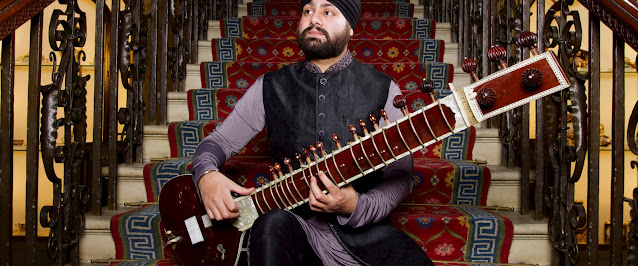
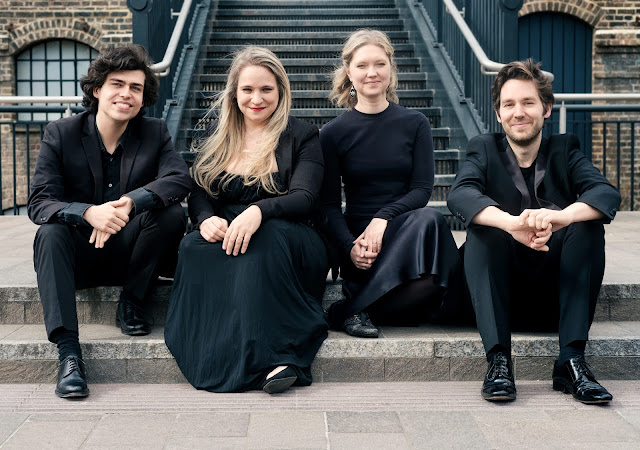
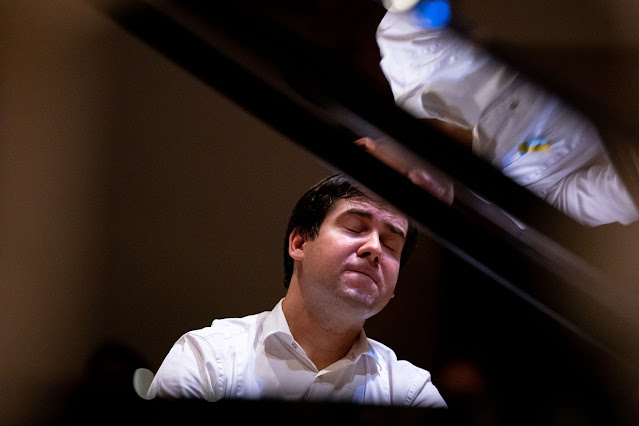
%20Jean-Baptiste-Millot%202.jpg)


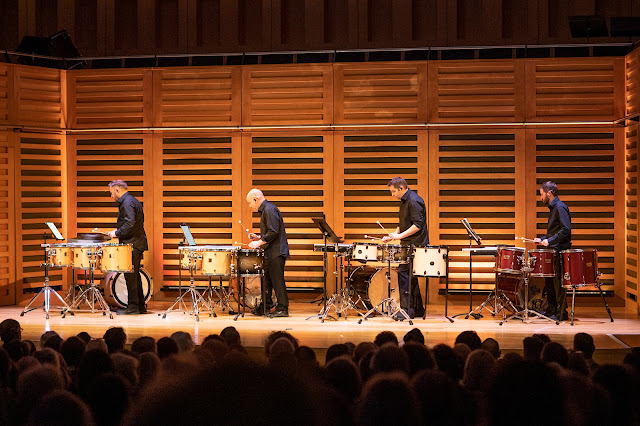
%20Dimitri%20Djuric%20LO%20RES.jpeg)


%20Sussie%20Ahlburg.jpg)




.jpg)

.jpeg)





.jpeg)